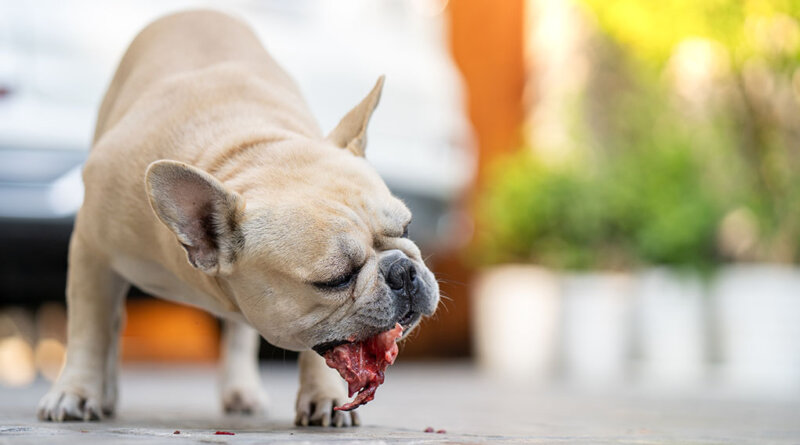Can You Feed Exotic Meat to Dogs? – Top Dog Tips
Meat is a wonderful source of protein and other nutrients for our fur buddies but have you ever wondered if you can feed exotic meat to dogs? That’s exactly what we’re going to talk about here.
One of the most consumed meat worldwide is pork, but these days poultry production has remarkably increased due to its low cost. But is pork the best meat for dogs?
The usual meat that is commercially known worldwide would be poultry, pork, and beef. Some may include lamb too.
Not all of the time that these meets may meet the diet or nutrients our fur buddies need. So can we give them anything other than the usual menu?
The answer is yes. Exotic and game meat are known to be a great source of fresh and plenty amount of nutrients than your commercially modified meat on the market.
These wild meats bring so many nutrients, flavors, and aromas making your dog’s diet a bit more sensational.
Give your dog a taste of the wild with these exotic or game meat flavors. But let’s find out what exactly is exotic and game meat.
Exotic Meat or Game Meat: What Is It?
Before we tackle if you can feed exotic meat to dogs, let’s first discuss what even are these exotic meats?
Exotic and game meat may mean differently everywhere else. These meats are the ones that are not commercially introduced to the market on a large scale typically.
It can be often found in farms, smaller dry markets, or dry markets that are specialized in these kinds of meat as well, or the obvious answer: the wild.
Depending on the country, some meats are endemic and are commercially sold generally but in other countries, they may be considered exotic.
Of course, habitat, region, tradition, culture, religion, and economics may play a part in countries in determining what’s endemic and exotic meat.
But exotic meat and wild meat are usually those meats that aren’t commercially introduced into the market. Exotic meat is animal meat from non-domesticated or feral mammalian and avian species, reptiles, and amphibians.
These meats are hunted by humans for consumption. These are usually found in tropical and subtropical regions but they can also be found in countries with other climates.
What is Considered Exotic or Game Meat?
Game meat refers to land animals that are hunted for consumption. It is usually those that are not cultured on farms.
Game meat is meat that is not classified as cattle, sheep, goat, swine, horse, mule, or other equines.
Three categories of Game Meat:
- Small Birds
- Game Proper (Winged Game and Ground Game)
- Big Game
Game meat includes antelope, bear, bison, deer, elk, moose, muscat, nutria, possum, rabbit, raccoon, reindeer, squirrel, water buffalo, and non-aquatic reptiles such as land snakes.
Ratites,non-flightless birds like ostrich and emu, are not recognized as game meat.
Now, let’s discuss if can you feed exotic meat to dogs.
Can You Feed Exotic Meat to Dogs?
Yes. Dogs and cats are carnivores and omnivores, to begin with. They strive with diets from different kinds of meat they hunt and eat.
Pork, beef, and chicken may be usual choices for meat as diets in your dogs but there is a variety of meat dogs can enjoy too.
Since dogs of different breeds have different needs. It’s best to consult with the veterinarian regarding what exotic or game meat you have in mind to introduce to your dog.
Since some dogs require more protein and some require a different nutrient, the veterinarian will discern what is best given to them.
This may be critical with dogs with allergies, owners have to be extra careful when introducing exotic food to their dogs.
Since allergens are still present in exotic and game meat, introducing this new meat is best done in small portions and intervals.
Report any reactions to the veterinarian regarding their reaction, positive or negative. This will help determine if the meat introduced is beneficial and compatible.
Benefits of Exotic and Game Meat
As dog owners may wonder, what does game meat have to offer to their dog?
Allergy Friendly
Game Meat is best for dogs with allergies since poultry and other meat may contain allergens not compatible with a lot of dogs. Game meat may be the choice for protein instead.
Owners may check with their dogs to see if there are any adverse reactions to feeding game meat.
Giving their dog small amounts in intervals and observing any reactions from physical to body language may help determine if there is a negative reaction from their body.
Remember to inquire with your veterinarian first regarding this matter. It’s best to ask a professional what game meat a certain breed may or may not have. Not all breeds are receiving other types of food in their digestive tract.
If the veterinarian approved, owners may try and give their pets so. Remember to halt immediately if there is any unusual reaction from their dog.
Owners can have the dog checked immediately to avoid any further issues.
Food Intolerance Prevention
Like humans, dogs can also develop allergies or food intolerance after being exposed to certain things for a long period.
It’s best to have their diet diverse and in intervals. Fortunately, exotic meat is just the right ingredient to prevent food intolerance.
Owners can ask how often can their dog’s diet be rotated too. Owners will be likely advised to try different exotic meat in small portions for a while to check any positive and negative effects, and the veterinarian will give a verdict in regards to this.
If the dog’s diet is in rotation, it can help prevent food intolerance and, of course, taste different meals now and then. That’s a win for your fur buddy too.
Fresh from the Wild
As we know, a lot of meat that is on the market has been processed already.
It may have undergone chemically modified diets and treated, different inspections, or even chemically processed. These modifications may offer different kinds of subtle flavors too.
Game meat is different. These animals’ diets are natural and not modified chemically.
When hunting or obtaining the game meat, hunters or owners may decide when and how to store this meat.
Commercial meat is slaughtered and processed for days before releasing it on the market while wild game meat is slaughtered on the spot and can be inspected to whether it’s good for consumption or not.
Game meat is also known to be stored for a longer period but not affecting its quality and nutrients but it’s still best consumed fresh from the hunt.
High-Quality Diet
Game meats are one of the best sources of all-natural nutrients. Since their diet is from the wild as well, there are the least exposed to chemicals and chemically modified bodies.
Protein found in game meats is less fatty than in other meat. Since exotic meats are leaner, there is less risk of gaining weight.
It’s important to remember that these meats contain more nutrients than your average everyday meat.
Inserting these into their diet must not be hastened and must not be served daily. It’s best to balance and vary the meal they get every day.
Similar to duck, which has high-fat content, it must not be given daily but rather weekly.
Cost-Friendly
Owners who have access to exotic meat or game meat in their hometown or region are in luck. They can obtain reliable and steady exotic and game meat sources without having to go all through the trouble.
Since the wild meat is within their radius, securing it and inspecting it if it’s reliable and healthy will be one of the few steps to do left.
Depending on where the owner resides, some regions offer medium, small, or none at all as a cost in obtaining wild meat. Of course, that depends on the circumstances the owner is in.
Disadvantages of Exotic and Game Meat
Extensive Self Inspection
All food should be inspected for prevention and safety for the one who will be consuming it. Dogs are not an exception.
Although their ancestors are wild, dogs have been bred to stay alongside humans and that includes modifying their diet.
Domesticated dogs may have changes in their digestive and immune system in terms of breaking down nutrients from certain foods.
Of course, not all wild meat is safe. Self-inspecting is a key to determining whether it is good for consumption or not.
Some wild meat may contain pathogens and bacteria that are not safe for your dogs. Pathogens and bacteria may disrupt the balance in their tract if neglected.
Limited Access
Unfortunately, access to exotic and game meat may depend on where owners reside. Owners will have to find steady and reliable sources of supply of this meat.
Since it is not as commercially prominent as regular meat, sources are very limited and elusive.
Not to mention, animals are also affected by seasons. Seasonal and regional availability is inevitable.
Not for Everybody
Although exotic and game meat may seem exciting as an addition to your pet’s diet, it’s not compatible with every dog.
Sadly, some dogs cannot digest this meat at all even when modified. It’s best to find homemade or at least high-quality dog food instead.
Forcing the dog to stick with the diet may lead to adverse effects on the digestive tract or immune system. It’s best to ask the veterinarian what will be the best option or solution to help the dog instead.
Not-So Budget-Friendly Exotic Meats
As scarce as it is, the value is higher. Limited access may also mean higher costs for this wild meat.
Since this meat is not farm-raised kind, the manufacturing costs of this wild meat are higher because of its scarcity.
Yes, it is a great addition to your dog’s diet but the price is quite high depending on its supply.
If owners reside in a region where it’s more common to come across this wild meat, it may mean as a budget-friendly option. But for those who are not, securing a supplier with a reliable source of meat will be costly as well.
Not to mention, inspection is costly. If the catch isn’t up to standard, it is immediately discarded as it may affect both humans and dogs if further handled or consumed.
Exotic and Game Meat Preparation
Preparing wild meat for your dogs may ask you to extend a few of your usual efforts with normal dog food. There are necessary steps in considering and completing before owners can give wild meat to their pets.
Select the Wild Meat
Make sure that this wild meat has been approved by the veterinarian for diet testing. It’s best to obtain healthy young meat rather than those that are old, injured, and sick.
Inspect Thoroughly
Inspection can be done by a professional. This can help determine if the meat obtained is good for consumption or not.
This process is important. If this process is skipped, there’s a high chance of health risk.
Serve Right Away or Freeze
Wild meat can either be cooked and served after being caught or can be stored and freeze then served when desired to.
Enjoy
Voi-la! Watch the dog enjoy their delicious and healthy meal.
Frequently Asked Questions About Feeding Exotic Meats to Dogs
Can I feed my dog raw wild game?
There’s a lot of debate about whether wild meat should be given as raw to dogs. Veterinarians recommend inspecting this meat and having it cooked high enough to kill bacteria.
Bacteria can be detrimental to their health. It’s better safe than to risk the dog’s health for a diet that’s not yet definite.
What wild meat should I avoid giving my dog?
Although wild meat is a high source of nutrients, some of these wild meat may risk health implications.
Wild carnivores (bear, coyote, elk, fox, mice or rats, raccoon, wild hog, etc.) and omnivores, predatory fish (shark, swordfish, tuna), and vector species (amphibians and frogs are best not given to them at all.
Some of these meets are not compatible with our fur buddies’ digestive tract. Some carry viral diseases that are contagious to dogs.
Not to mention, those who are high on the food chain carry most of what their prey has eaten.
Does wild meat make my dog aggressive?
This is a common misconception for dogs with a wild meat diet. No, it does not make your dogs aggressive.
More commonly, dogs with food guzzling issues have more reasons owners should look into.
Just because they are given a diet that resembles their appetite back in the wild doesn’t mean they’ll turn into wild dogs overnight.
Dogs who become aggressive after being introduced to wild meat are usually because they’re protecting their unusual new delicious food.
If they are given a more diverse diet and are likely stolen by other pets, they’ll be less likely to be overprotective of their food.
Can You Feed Exotic Meat to Dogs: Summary
Exotic and game meat is one of the new gems in the best meat for dogs agenda. So the question is, can you feed exotic meat to dogs?
Humans have enjoyed their fair share of exotic meat worldwide. Dogs can also enjoy this curiosity. There are a lot of benefits when it comes to exotic and game meat for dogs.
Along with it are some bad points too.
Similar to pork and beef wherein it may be difficult to determine whether they were allergic or not, exotic and game meat can be difficult when it comes to their benefits too.
But of course, as owners, we should watch out for the dog’s diet and lifestyle to make sure it’s balanced.
It’s still best to have the dog’s diet varied and intervals with matching daily exercise and training.
Veterinarians can keep in check whether their diet is good or not. Owners can also ask for tips regarding serving wild meat.
RELATED: CAN DOGS EAT TURKEY MEAT?
Related









